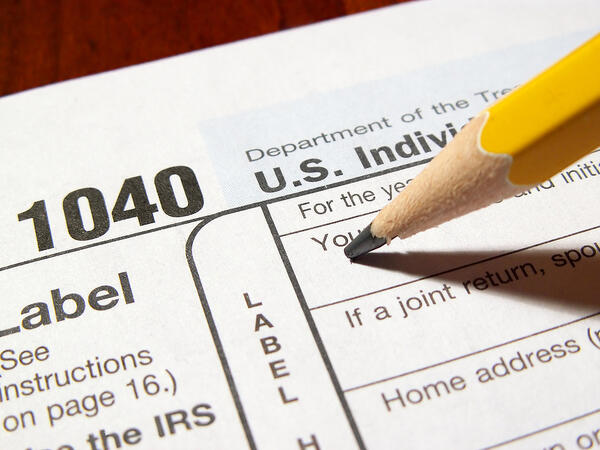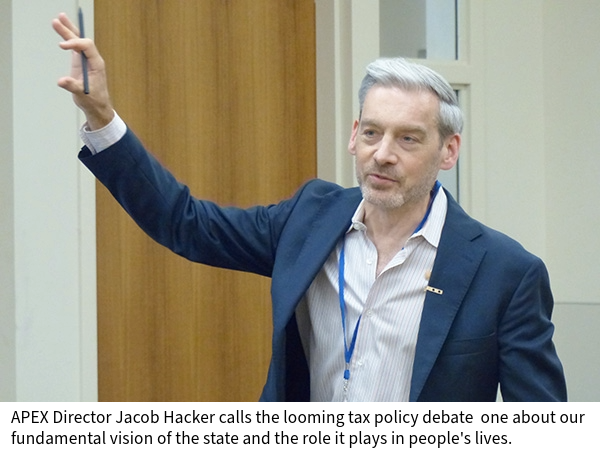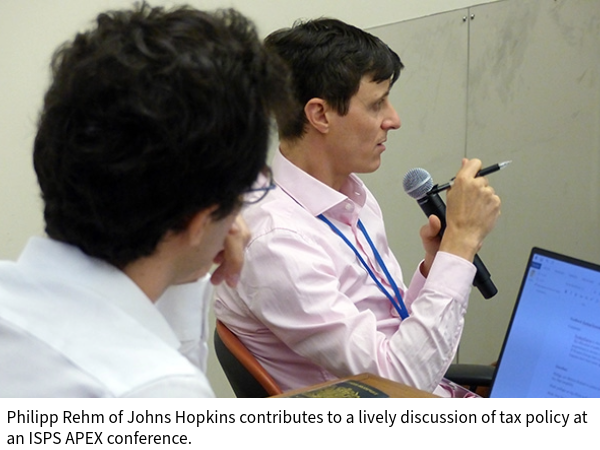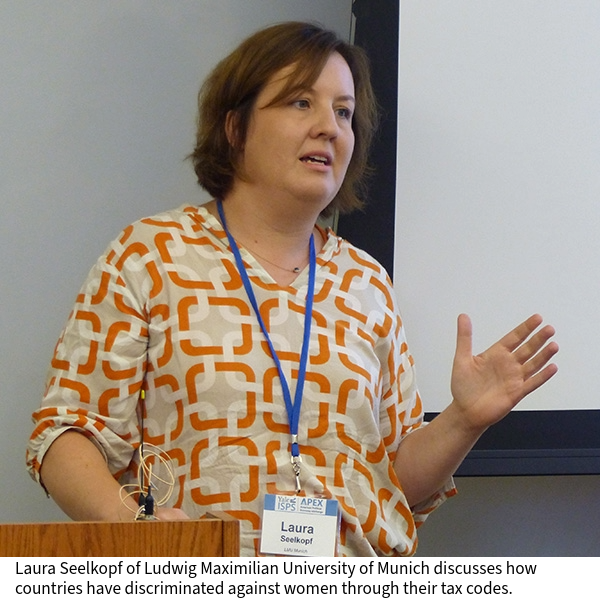Yale Conference Explores Tax Policy Changes and Election Stakes

When voters consider candidates for November’s presidential and congressional elections, they won’t just be deciding who occupies the White House and which party controls Congress. They will also be shaping the future of U.S. tax and budget policy.
Many of the key provisions of the big 2017 tax bill passed by President Donald Trump and a Republican Congress are set to expire next year. Extending all the tax cuts — which primarily benefited the highest earners and corporations — would cost over $4 trillion in the next decade, according to nonpartisan estimates.
“This is the most important tax reform moment that we’ve had since the late 80s,” said Natasha Sarin, a professor at Yale Law School, former deputy assistant secretary for economic policy at the U.S. Department of the Treasury, and former counselor to Treasury Secretary Janet Yellen.
Sarin was speaking earlier this month at a conference on tax policy organized by the Yale Institution for Social Policy Studies’ American Political Economy eXchange (APEX).
“This is a real opportunity for all of us to get a sense of how people are thinking about priorities, about trade-offs, and about what the impact of November’s election will have on the universe of possible outcomes that we might see,” she said.
The conference featured economists, legal scholars, political scientists, advocates, and policy experts engaged with the latest research and developments affecting tax policy. APEX at ISPS is also part of the Consortium on American Political Economy (CAPE), founded in 2020 with the support of the Hewlett Foundation.
“The debate about taxes is and has always been about inequality in the United States,” said Jacob S. Hacker, APEX director, Stanley Resor Professor of Political Science at Yale, and faculty co-director of the Ludwig Program for Public Leadership at Yale Law School. “The stakes for our country’s and the world’s fiscal future are high and uncommonly clear. This debate is about the fundamental vision of the state and the role it plays in everyone’s lives. It’s also about democracy — who gets to choose our priorities, who benefits, and who might not.”

In addition to Sarin, participants included Amory Gethin of the World Bank; Laura Seelkopf of Ludwig Maximilian University of Munich; Mads Elkjær of the University of Copenhagen; Torben Iversen of Harvard; Kris-Stella Trump of Johns Hopkins University; Paul Marx, an APEX visiting fellow from the University of Bonn; Patrick Sullivan, an APEX postdoctoral fellow; Charlotte Cavaillé of the University of Michigan’s Gerald R. Ford School of Public Policy; Vanessa Williamson of the Brookings Institution; Zachary Liscow of Yale Law School; David Hope of King’s College London; Suzanne Kahn of the Roosevelt Institute; Philipp Rehm of Johns Hopkins University; David Mitchell of the Washington Center for Equitable Growth; Chuck Marr of the Center on Budget and Policy Priorities; and Josh Bivens of the Economic Policy Institute.
Hope, a senior lecturer in political economy, presented data from 18 countries belonging to the Organization for Economic Cooperation and Development (OECD) to estimate the average effects of major tax cuts for the rich between 1965 and 2015 on income inequality, economic growth, and unemployment. He and his co-author found that major tax cuts widened inequality but had no significant effect on a nation’s economic performance, represented by change in gross domestic product (GDP) or unemployment rates.
“Our study provides strong evidence against the influential idea that tax cuts for the rich lead them to work and invest more, which then trickles down to boost the wider economy,” Hope said. “Conversely, our results are consistent with other findings that lower taxes on top incomes induce the rich to bargain more aggressively to increase their own rewards, to the direct detriment of those lower down the income distribution.”
Kahn, vice president of the think tank at the progressive nonprofit Roosevelt Institute, said that the top-earning 1% of taxpayers — the majority of whom are white men — enjoy a larger tax cut in a single day from the 2017 tax cut legislation signed by former President Donald Trump than the poorest 20% of taxpayers receive in an entire year.
She saw the election and the looming tax debate as an opportunity to not just reverse the effects of the 2017 cuts but to at least start a conversation about discarding the concept of trickle-down economics in the tax code.
“I think the way that people have looked at this has changed a lot in recent years, especially as inequality has risen dramatically,” Kahn said. “If you look at polling now, people are willing to pay taxes if rich people start paying their fair share.”
Gethin presented a study in which he and his co-authors concluded that tax and transfer systems provide weak explanations for the levels and trends in inequality. They found that the United States redistributes more wealth to low-income individuals than any European country. The reason why inequality is worse in the United States than in Europe has more to do with what Hacker has called “predistribution,” initiatives aimed at curbing income inequality by addressing its root causes before it arises, rather than reallocating wealth after it has been generated.
“Many people in the United States believe that they pay a lot of money in taxes every year, but the truth is that the U.S. is truly an outlier in comparison to every country with high levels of income,” Gethin said. “Another common misconception is that if you work hard, you can make it regardless of how few resources you have to start. The United States has one of the lowest levels of intergenerational mobility across advanced economies, which means that if you’re born into a low-income family, it’s going to be extremely hard to reach the middle class.”
Rehm presented findings from a currently unpublished study he conducted with Hacker, seeking to understand a paradox in which previous studies found that greater inequality in a country does not seem to lead to greater redistribution. The researchers studied 23 rich democracies and found that more inegalitarian societies did in fact redistribute more but that this redistribution stemmed from “policy drift,” as relatively unchanged tax-and-transfer systems encountered escalating inequality, and not through politicians deliberately responding to voters’ demands for policy reforms.

Because this more-or-less automatic redistribution was inadequate to reduce inequality substantially, Hacker and Rehm argued, policymakers should pay more attention to predistrutive policies that reduce market inequality in the first place.
Seelkopf discussed how countries have discriminated or continue to discriminate against women through their tax codes. In most rich countries, women in joint-earner couples — because they still on average earn less than men — face very high marginal tax rates, discouraging work. Seelkopf pointed out that discrimination is sometimes even more overt. For example, before 1995 in South Africa, unmarried individuals and married woman paid a higher tax rate. Until 2014, the wealth of all married couples in Argentina belonged to the husband. Currently in Switzerland and until 2020 in Germany, the tax declaration is only under the name of the husband.
“I would not have been able to contact the tax authorities in Germany and ask about my own taxes,” Seelkopf said. “They wouldn’t have told me anything.”
Marr, vice president for federal tax policy at the Center on Budget and Policy Priorities, an anti-poverty think tank, said the 2017 tax cuts were expensive and a key priority of the upcoming debate should be to raise more revenue, given the aging of the Baby Boom generation and our unmet investment needs. He also called for a permanent expansion to the child tax credit passed temporarily during the pandemic and for the continued rebuilding of the IRS to ensure that everyone, particularly wealthy people, pays their taxes.

Liscow thinks that there are many excellent tax proposals out there, but he would begin with reforming the international tax regime, which would raise $500 billion dollars in 10 years, and increasing the corporate tax rate to raise another $1.3 trillion.
In terms of what gets enacted, “a lot boils down to politics,” Liscow said.
“What economic policy experts think is good policy and what members of Congress think is good policy aren’t always the same,” he said. “That doesn’t mean economic policy experts are always correct. Or that politicians are wrong to base their positions in part on what the public thinks — that’s worth paying attention to in a democracy.”
At the same time, economists often do not agree on good tax policy. For example, some economists support tax cuts for wealthy people.
“But if you’re someone like me, and you want to have a fairer tax code in a way that it meets important revenue needs and achieves greater equity, we try to find the sweet spots of good policy and achievable politics to raise taxes in reasonable ways on those who can afford to pay.”
Which, this year as much as any before, involves value judgements in addition to empirical evidence.
“Within economics, there’s a wide range of opinions, including well-respected economists who supported much of the 2017 Republican tax proposal,” Liscow said. “But many economists did not support those tax changes. My read of the evidence is that there hasn’t been much benefit to economic growth from them. And at the same time, those tax cuts have substantially increased the national debt and inequality. Some disagree on the evidence. And others disagree on values. So, this issue, in part at least, comes down to how much you care about inequality.”